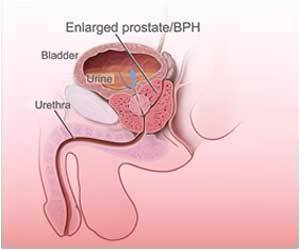Lycopene, the antioxidant present in tomatoes may have a role in the treatment of prostate hyperplasia (BPH).

- Benign Prostatic Hyperplasia (BPH) is a very common disease, which affects almost 50% men by the age of 60 years.
- Prostate hyperplasia causes urinary problems due to blockage of the urinary tract.
- Lycopene, an antioxidant found in tomatoes, may slow down the progression of the disease.
A study conducted in China revealed that traditional diets rich in fruits and vegetables significantly lowered BPH rates.
A study conducted at the University of Hohenheim, Germany investigated the results of lycopene supplementation in BPH patients and revealed an absence of further growth of the prostate in patients who were supplemented with 15 mg lycopene daily for 6 months while the prostate continued to grow in those who were administered a placebo (dummy pill). The levels of PSA were also found lowered after lycopene administration.
Prostate and Hyperplasia
The primary role of the prostate in men is in enhancing fertility by contributing the liquid part of the ejaculate which contains fructose, an energy source for the sperm, and PSA (Prostate Specific Antigen), a protein which increases sperm motility. The gland is present at the base of the urethra and the normal growth of prostatic cells is regulated by the growth cycle and various hormones.With age, the cells lose their ability to respond to apoptotic (programmed cell death) signals and this results in anexcessive increase in the cell numbers and formation of extra smooth muscle tissue which results in a larger gland.
Dihydrotestosterone, a derivative of testosterone (male hormone) is also responsible for the growth of the prostate. It is formed in the body by the action of 5-alpha reductase on testosterone. Increased levels of the enzyme may cause an overgrowth of the gland.
Patients suffering from BPH experience uncomfortable symptoms like need to urinate frequently, inability to empty the bladder, difficulty in initiating the act of urination and recurrent UTIs (Urinary Tract Infections). Medical management is done to slow down the progression of the disease but if symptoms become too bothersome, surgical intervention may be needed.
Role of Lycopene in BPH
Lycopene is a carotenoid that gives the tomato its red color. It has been observed in the conducted review that lycopene not only lowers the risk of prostatic cancer but also inhibits prostatic growth in general.- It promotes the production of proteins which regulate the growth cycle. Reduced sensitivity of the cells to these proteins is balanced by an increase in the number of the proteins and the growth cycle is thus regulated.
- Lycopene also inhibits the growth of the prostate cells by reducing the quantity of cyclin D1, a protein which causes cell proliferation.
- Lycopene also reduces the expression of 5-alpha reductase and results in lower levels of dihydrotestosterone. The reduction of local androgen signaling prevents prostatic overgrowth.
- Lycopene also markedly reduces growth stimulated by Insulin-like Growth Factor by inhibiting IGF signaling.
Further research is still needed to investigate the correlation before lycopene may be advised in routine but the review definitely sounds promising and opens a new door in the treatment of prostatic hyperplasia.
References:
- Lycopene Inhibits Disease Progression in Patients with Benign Prostate Hyperplasia
https://www.researchgate.net/profile/Hans_Biesalski2/publication/5693630_Lycopene_inhibits_disease_progression_in_patients_with_benign_prostate_hyperplasia/links/00b7d52286a787a580000000.pdf - Effect of Carotene and Lycopene on the Risk of Prostate Cancer: A Systematic Review and Dose-Response Meta-Analysis of Observational Studies
http://www.ncbi.nlm.nih.gov/pmc/articles/PMC4570783/ - Lycopene inhibits disease progression in patients with benign prostate hyperplasia.
http://www.ncbi.nlm.nih.gov/pubmed/18156403






![Prostate Specific Antigen [PSA] Prostate Specific Antigen [PSA]](https://www.medindia.net/images/common/patientinfo/120_100/prostate-specific-antigen.jpg)






